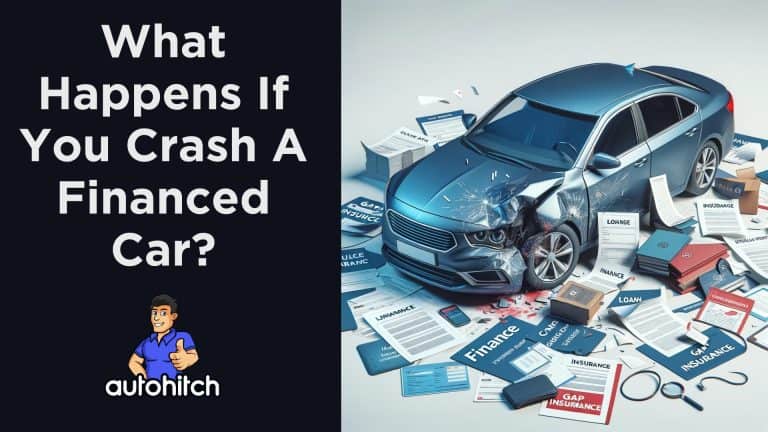Crashing any car can turn life upside down. But an accident is extra worrying when you still owe money on your vehicle.
So, what happens if you crash a financed car with insurance?
Fortunately, insurance can cover repairs or replacement costs if a financed car is damaged.
Here’s what to expect financially after an accident, including paying off your loan, using gap insurance, and seeing rate increases.
Related Articles To Read:
- Who Gets the Insurance Check When a Car is Totaled?
- Can You Drive A Car Once The Airbags Have Deployed
- What Happens If You Total A Leased Car
Table of Contents
Can Insurance Pay for a Financed Car’s Repairs or Total Loss?
Yes, a standard auto insurance policy will pay for a financed car’s repairs or value if it’s totaled (declared undriveable). But you remain liable for the remainder of your car loan and will keep making payments through the process.
- If the car is repairable, collision coverage handles repairs up to your limits, minus any deductible you pay out of pocket.
- If it’s totaled, the insurer pays the car’s actual cash value (ACV) – what it was worth at the time. This payment typically goes to your lender to pay off as much of the loan as possible.
So insurance provides some coverage, but you aren’t off the hook for the loan. Let’s look at questions around paying off your remaining balance.
What If Insurance Doesn’t Fully Pay Off My Loan?
Unfortunately, it’s common for insurance settlements to fall short of what you still owe on a total loss vehicle – known as being “upside down” on the loan. In this case, you’re responsible for the remaining balance, though gap insurance can help.
Can I Use Gap Insurance To Pay the Difference?
Yes, gap insurance covers the gap between what your car insurance pays (the ACV) and the remaining loan balance. If you owe $18k on your loan but insurance only pays the $12k current value, gap insurance bridges that $6k difference so you don’t pay out-of-pocket.
- Gap insurance only covers the remainder of the finance contract, not other accident-related costs.
- Consider gap protection if you put little money down or have a long loan term.
Without gap coverage, you must continue paying installments on your totaled car to settle the entirety of the loan. This financial risk underscores why gap insurance merits consideration.
How Does Making an Insurance Claim Impact My Rates?
Filing any claim typically leads your provider to charge higher premiums at renewal time because you’re now seen as a higher risk. Rate hikes vary by company and policy details, but often range 10-30%. Significant claims can produce even larger increases.
- At-fault accidents have a greater impact on premiums than claims where others caused the crash. But there is usually some increase regardless of fault after filing a claim.
- Shopping around could score you lower rates even after a claim-triggering accident. Don’t automatically accept an insurer’s renewal quote.
The takeaway is that insurance picks up repair or replacement costs tied to your financed car, but you remain on the hook for paying the entirety of your remaining loan balance. And higher insurance rates loom after claims too.
What Steps Should I Take If I Crash My Financed Vehicle?
Acting promptly and accurately after an accident with a financed car makes navigating the frustrating financial and insurance components much smoother. Follow this checklist:
1. At the Scene
- Move to safety and call 911 if anyone appears injured
- Gather other driver’s license, registration, and insurance data
- Photograph damage to all vehicles from multiple angles
- Don’t admit fault or agree to settlement offers
2. Next Steps After Leaving the Scene
- Take photographs of your injuries (if any)
- Seek medical attention even for minor discomfort
- File a police report documenting details like location, damage, injuries
- Contact your lender per your finance agreement to report the incident
- Review your auto policy so you thoroughly understand your coverage
- Call your insurance company within 24 hours to start your claim
3. Ongoing Considerations After Claim is Filed
- Send demand letter to at-fault insurer seeking payment if needed
- Consider hiring an attorney to assist negotiating the claim and settlement
- Keep making monthly payments toward your loan through the claim process
- Research gap insurance options to fully pay off your loan even if the vehicle is totaled
Follow these guidelines, understand the financial implications, and review all paperwork thoroughly. This positions you to limit out-of-pocket expenses and frustrations if the misfortune of crashing your financed car arises. No one expects an accident, but preparing now helps minimize the ultimate damage.
Sources For This Article:
- https://silvainjurylaw.com/articles/car-accidents/what-happens-if-you-crash-a-financed-car-in-california/
- https://wallethub.com/answers/ci/what-happens-if-you-total-a-financed-car-with-full-coverage-2140855885/
- https://www.alllaw.com/articles/nolo/topics/what-happens-when-you-total-a-financed-car.html



